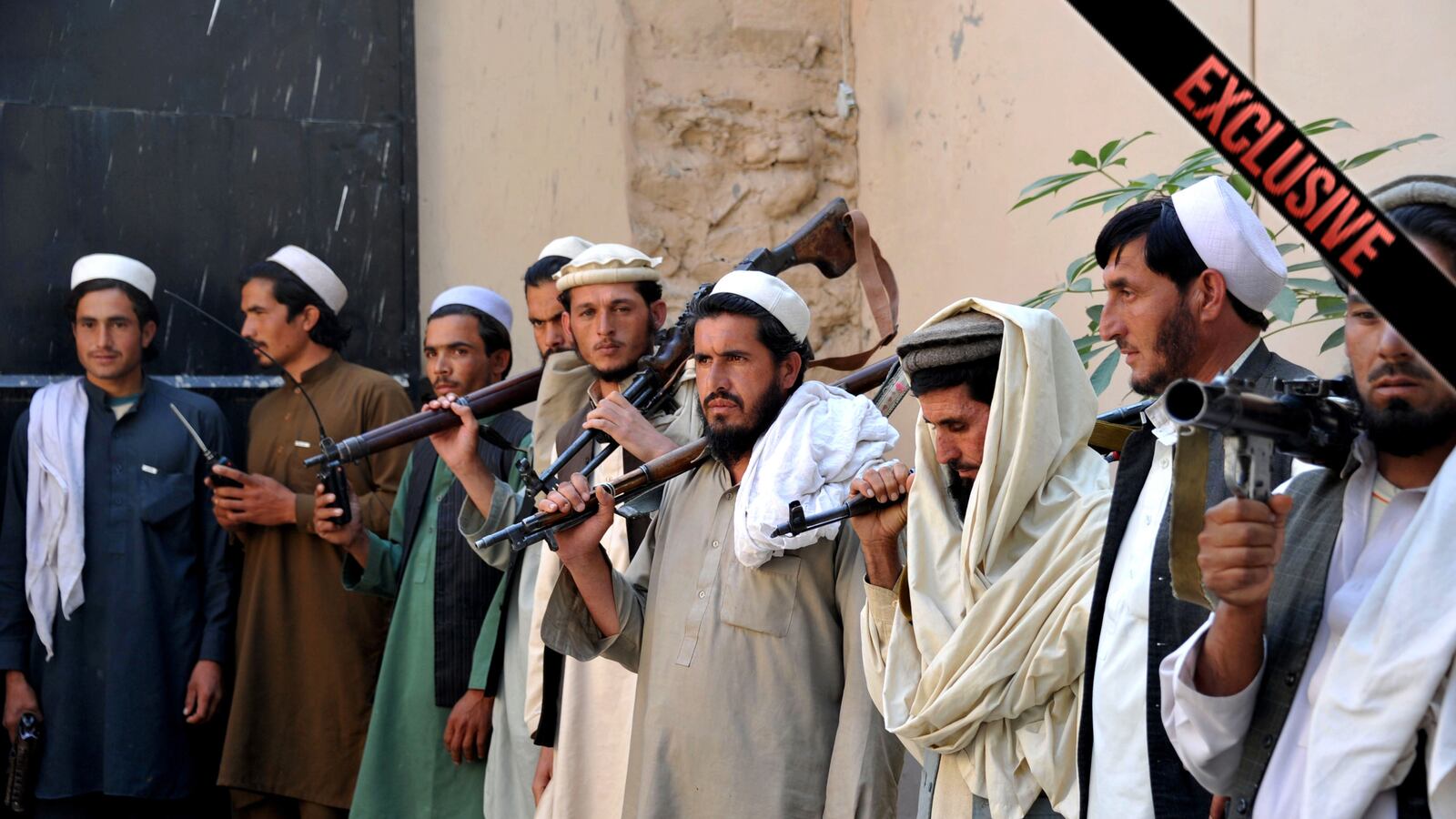The wizened, battle-hardened Taliban commander, who has been fighting for Mullah Mohammad Omar for the past 15 years, had been considering an option over the past year that he never would have imagined before. He had heard that U.S. and coalition military forces would likely be withdrawing voluntarily from the country by the end of next year. If that proved to be true, he thought, he would seriously contemplate the possibility of leaving the insurgency and trusting that a peace treaty between the Taliban and the Afghan government could be hammered out in the absence of foreign forces.

But his reverie of peace was shattered when a traditional Afghan grand council meeting this past weekend, under the leadership of President Hamid Karzai, unanimously approved a Bilateral Security Agreement (BSA) between Kabul and Washington that would allow a large contingent of some 10,000 U.S. and coalition troops to remain in Afghanistan for another decade. His immediate reaction to the news was deep disappointment, even outrage. “I was thinking that if all foreign troops left Afghanistan I would seriously consider laying down my weapons and place my hopes in peace,” the commander, who declines to be quoted by name, tells The Daily Beast. “But now I will fight on and never disarm as long as there is a presence of infidel forces in my country. Any hope I had for peace is now dead.”
Like many other Taliban, the commander fails to understand the logic of Kabul wanting to prolong the war for another decade or more, while at the same time killing the prospect of reaching a peaceful settlement to end the destructive 12-year-old conflict. “Doesn’t Kabul understand that peace talks with the Taliban are more important than having foreign forces here,” the commander asks. “The whole point of our long and hard resistance was to expel these foreign troops from the country.”
“Now we will redouble our efforts as more Afghans rally to our cause to fight the remaining invaders,” he adds.
His remarks are echoed throughout the Taliban’s ranks. “This permanent American military presence will continue to fuel the insurgency even more,” says Zabihullah, a senior Taliban political operative who has close ties to the insurgency’s top leadership. “Without the American presence there would have been hope for a negotiated solution but not anymore.”
The new security pact will likely silence forever the moderate Taliban voices that have long been arguing in favor of negotiations. “This is a setback for those Taliban who had been raising their voices in favor of negotiations against those with the ‘jihad forever’ mentality in our ranks,” Zabihullah says. “Now such voices will become weaker, if not silent.”
“With the continuing U.S. military presence, our most militant warriors will have a strong argument for their position of ‘jihad forever,’” he says.
Other Taliban commanders agree. “We have even more justification to attack this government that continues to be protected by U.S. forces,” says Mullah Haji Jan Muhammad Akhund, a Taliban commander in the southern Afghan province of Helmand. “Karzai just sold our precious mud and land to the Americans for another decade or longer. This cannot be tolerated.”
One senior Taliban officer is even buoyed by the BSA. He expects it will motivate younger Afghans to flock to the Taliban now that it seems foreign forces will stay in Afghanistan indefinitely, pushing any peace deal off the table. “This long-term presence of infidel forces will definitely attract more Afghans to the jihad,” the officer says. “Now everyone knows there is no hope for peace talks any longer, and that we are now entering into 10 or more years of war.”
Zabihullah believes the pact will also put the Taliban back on the global jihadists’ map. “The continued presence of U.S. troops for years to come will serve to attract worldwide jihadists back to our cause,” he says.
A senior government minister in Kabul is more sanguine about the possibility of eventually restarting peace talks. He doesn’t believe that the prospect of peace negotiations with the Taliban has vanished with the passage of the security agreement. “Perhaps in the short run it is understandable that the Taliban are disappointed, even angry, about the BSA,” the senior minister, who does not want to be quoted by name, tells The Daily Beast. “But peace talks are a long process that should be pursued. We cannot rule out a resumption of the talks at some future time.”
The minister, like many Afghans—particularly those living in urban areas—strongly believes the security pact is in the country’s interests. “The deal secures a commitment of the U.S. and the international community to Afghanistan in the long run,” he says. “It is vital to our security and economy.” A popular Afghan blogger Majeed Qarar goes even further. “This Afghan-American security deal means the end of the Taliban,” he writes.
But Zabihullah, the Taliban political operative, believes the BSA will only strengthen the bonds between rural Afghans and the insurgency. “Our villagers strongly believe that it is un-Islamic to keep non-Muslim forces in our country,” he says. The senior Afghan minister agrees. Although Karzai told the Loya Jirga, the grand council meeting, that all of Afghanistan’s neighbors except Iran supported the deal to maintain a U.S. military presence for another decade, the minister is not so sure. He fears a rural domestic backlash and continued foreign meddling as a result of the pact. “The reaction of many Afghans and our neighbors and the Russians is cautious, even negative,” he says. “But we are doing this in our own national interest.” He, like many Afghans, fears that Pakistan, regardless of the agreement, will continue to intervene, offering safe haven and other means of support to the insurgents.
The minister also worries that a long-term foreign presence may also mean continued cultural and religious clashes between Afghans and U.S. and coalition soldiers. Cultural and religious flashpoints have nearly broken Afghan-U.S. relations in the past, such as when U.S. soldiers inadvertently burned Korans, and when a U.S. sergeant went on a rampage, murdering 16 Afghan civilians and children in their homes. Then there are also the scores of “insider attacks” in which Afghan security forces have trained their weapons on their foreign allies, largely over misunderstandings. The minister fears that now even lesser frictions could scupper the new agreement. “Afghans are sensitive by nature and any cultural or religious misbehavior by U.S. soldiers could have disastrous consequences for the security pact and the U.S. presence,” he says. “Even false propaganda that U.S. soldiers had raped Afghan women would create a huge reaction.”
Yet the BSA is not a done deal. President Karzai’s histrionics at the four-day grand council meeting have left the agreement hanging in limbo even though the some-2,500 hand-picked Loya Jirga delegates unanimously approved it. Karzai had raised a number of emotional issues for Afghans during his fiery speeches, for example, the hated night raids by U.S. soldiers into Afghan homes. Finally, he seemed to put the entire pact on hold, saying he would not sign the agreement until his successor had been elected in next April’s presidential election. This would be a potential deal breaker for the U.S., which had been demanding that the BSA must be signed no later than the end of this year.
The Taliban are not concerned about this or any other deadlines. For them, the damage has already been done. They feel betrayed by the pact and have concluded that peace negotiations are no longer an option, and thus the only option is continued war. As a result, Afghanistan is most likely condemned to a protracted conflict until 2024 and perhaps beyond.




